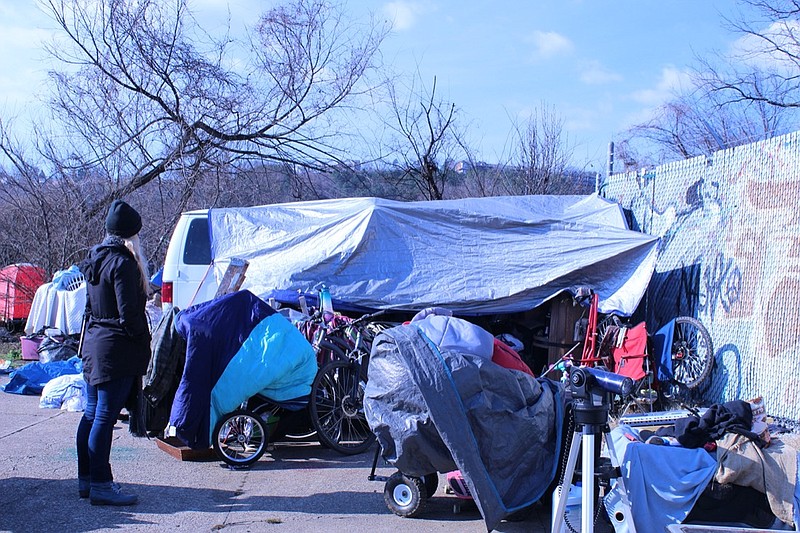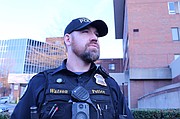Highlighted by local instances of police brutality, the nationwide responses to the death of George Floyd spurred a series of protests and calls for law enforcement reform in Chattanooga in the summer of 2020.
One solution that has been adopted across the nation has been to add social workers into the mix when responding to calls, and the Chattanooga Police Department already had a program in the works to respond to mental health crisis calls using a portion of a nearly $1 million grant from Volunteer Behavioral Health.
"This is another way to instill work and build a rapport with the community, so they can see us as a resource and not a hindrance," said Lt. Tim Tomisek with the Chattanooga Police Department. "This is a way of community policing. We have to make sure that we continue to press forward and continue to meet the community's needs."
While the department has trained officers to be members of a crisis intervention team, there is another level of help needed in the field, Tomisek said. The department has begun to test what is known as a co-response team, pairing a licensed clinician with a trained member of the department's crisis intervention team.
"The vast majority of our officers are compassionate, but that doesn't mean that they're qualified to help someone in a mental health crisis," Tomisek, the crisis intervention team manager and instructor for the Chattanooga Police Department, said in a telephone interview.
(READ MORE: 'Resorting to guns to settle their disputes': Violence spiked in Chattanooga in 2021)
The grant of $980,000 is for 21 months to help fund eight positions that will serve seven counties in Middle and East Tennessee, focused on those counties with the most calls involving people struggling with their mental health who pose a threat to either themselves or another person, known as a mental health crisis.
According to Tomisek, the police department averages anywhere from 30 to 45 mental health crisis calls a week.
Tomisek is a 20-year veteran with the Chattanooga Police Department. He has a bachelor's degree in psychology and is working on a master's in counseling with an emphasis on crisis and trauma. He said he sees this as an opportunity to further build and repair the fractured relationship between the police and the community.
Last month, the Times Free Press rode along with co-response team member Jenna Parker, who has a master's degree in social work from the University of Alabama.
While meeting with citizens on the street, Parker approached everyone she met professionally and tactfully, asking them questions about how they were doing and providing them with a community resource list of where they could find food, shelter and medical attention if they wanted it.
"It's cool because these people are starting to recognize us," Parker said. "I was just walking out of the Community Kitchen and this guy was like, 'Hey!' and I was like, 'Oh, hey!' and he was telling me about what's going on with him and some things he's struggling with."
Parker said that while some people may not be ready to seek help, having them speak to her or another team member is the first step.
"He may not be ready for treatment, but he's ready to talk to me, and that's a part of that first step of building that rapport and showing these folks that there are people who care and want to help, when [they're] ready," Parker said.
Parker and her temporary partner, officer Brandon Watson, checked on several people they had seen before, some of whom were in a homeless encampment on Strayer Street downtown. Watson went in first, ensuring people were comfortable with Parker's presence and that she would be safe while talking to them.
"We've tried to give them as much control and autonomy [to] talk to us," Watson said. "We don't try to, I guess, pressure them, you know? This is so they know that we exist and that they don't have to be afraid to talk."
As Parker and Watson went around the city, they stopped at the Walnut Street Bridge to follow up with another person who needed their services. As they exited the patrol car, they were flagged down by a woman in need. Following protocol, Watson approached first to establish safety and comfort, then signaled for Parker to step in.
She sat with the woman who began talking about her recent struggles. Parker made some phone calls and promised to help her gain access to a few more places that could provide substance abuse assistance, shelter and food, since the woman wasn't ready to leave her spot on the bridge.
Then a call came about a person threatening suicide.
Watson approached the man who was sitting on a bench in front of the Marriott Hotel downtown, speaking loudly, and asked him a few questions, including whether he wanted to speak to Parker. Watson patted him down to ensure he didn't have weapons and then nodded to Parker, who got out of the patrol car and began her assessment.
Parker, donning her 'mental health is cool' beanie, worked calmly, diverting the man's attention away from Watson and the two other patrol officers who were close by. A medical transport was called by Watson when he observed the man was having trouble breathing and was coughing in addition to his mental distress.
Once the medical transport arrived, both patrol officers left to continue their shift as Parker and Watson followed the ambulance to Erlanger, where the man was to be admitted.
"We get them checked in and make sure that they're taken care of," Watson said at the Erlanger emergency room before Parker began talking to medical staff about the man they'd just brought in.
The Chattanooga Police Department has been independently developing its co-response program since May. In November, Parker began working in the field and has responded to more than 10 calls since.
The goal, she said, is simple.
"Just providing folks who are in crisis with the best possible care that they can get, to help them move through the crisis," Parker said. "Starting to break down the stigma of people who have mental health issues, educating the community. Research shows that people who are having mental health issues are a higher danger to themselves than to others."
Kelsey Taylor, Volunteer Behavioral Health's community response and training director, said the co-response program helps to provide a much-needed personal connection between police officers and the community they serve.
"It's more than a co-response, you're really getting involved with people's lives and following up with them," Taylor said in an email. "The combined expertise of the responder and law enforcement will allow for increased safety and on-scene evaluation to help individuals obtain the most appropriate level of care while avoiding unnecessary emergency department admissions and offering an alternative to incarceration for crimes related to their mental illness."
According to Taylor, the Volunteer Behavioral Health crisis hotline receives more than 6,000 calls a year from different institutions around Chattanooga such as the police, emergency rooms and fire department, as well as prisons.
"In 2021, Hamilton County had approximately 6,025 mobile crisis calls," Taylor said.
(READ MORE: Chattanooga Mayor Tim Kelly named as co-chair of national gun control organization)
"Volunteer [Behavioral Health] chose to pursue this funding as we gathered data and learned more about the co-response model," Taylor said. "Co-response is gaining national attention and proving to be successful in other states and communities by helping officers engage with people experiencing a mental health crisis. We chose Chattanooga city police in particular based on our long-standing partnership working with them and their willingness to address these needs."
Other departments receiving co-responder grants through Volunteer Behavioral Health are the Cleveland Police Department, McMinnville Police Department, Cookeville Police Department, Murfreesboro Police Department, Lebanon Police Department and the Williamson County Sheriff's Office. So far, the Chattanooga and Gallatin teams are working in the field.
"We are still in the hiring process and actively looking for co-responders for the Cleveland, Cookeville and McMinnville positions," Taylor said.
Contact La Shawn Pagán at lpagan@timesfreepress.com or 423-757-6476. Follow her on Twitter @LaShawnPagan.

